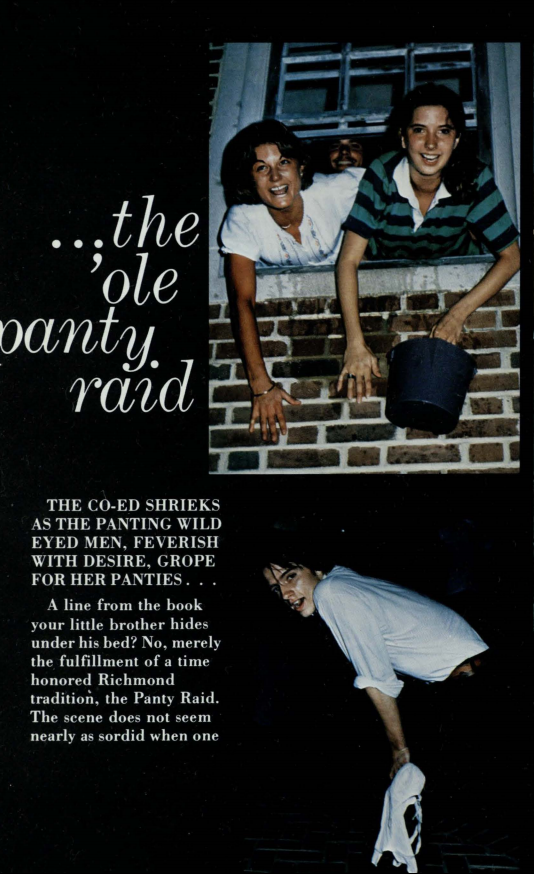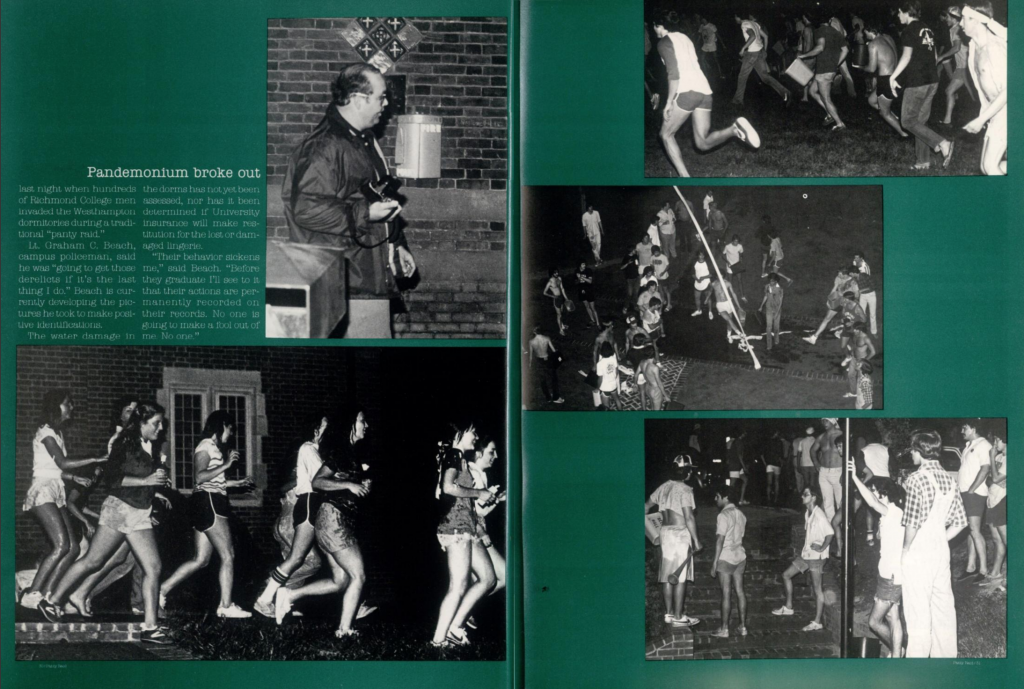by Catherine Franceski
Catherine Franceski is rising junior from Washington, D.C. majoring in Philosophy, Politics, Economics & Law (PPEL) with concentration in politics and minoring in Rhetoric & Communication Studies. She is the president of Phi Alpha Delta pre-law fraternity, and a member of the Westhampton College Honor Council. This is her second year working on the Race & Racism Project. Last summer, she focused on studying the lives and legacies of “hidden” black figures in Richmond, Virginia’s history.
 “The co-ed shrieks as the panting wild eyed men, feverish with desire, grope for her panties…. The scene does not seem nearly as sordid when one realizes that the girl in question, along with the other members of her hall, are carrying on this ceremony from the second floor of their dorm, safely out of reach of their assailants, and armed with an arsenal of trash cans filled with water. Having thus prepared themselves after discerning the tell-tale pre-Panty Raid ritualistic eries from across the lake, the girls are more than equal to the task of cooling their male counterpart’s ardor.”
“The co-ed shrieks as the panting wild eyed men, feverish with desire, grope for her panties…. The scene does not seem nearly as sordid when one realizes that the girl in question, along with the other members of her hall, are carrying on this ceremony from the second floor of their dorm, safely out of reach of their assailants, and armed with an arsenal of trash cans filled with water. Having thus prepared themselves after discerning the tell-tale pre-Panty Raid ritualistic eries from across the lake, the girls are more than equal to the task of cooling their male counterpart’s ardor.”
This is a satiric description in the 1979 yearbook of the annual “panty raid” tradition. Beginning in the 1950s, an annual “panty raid” tradition took place on campus when Richmond College students would cross over the bridge to the Westhampton College side of campus. Westhampton women would throw panties to the men from their dorm windows. Although this description is satirical in nature, its characterization of the men performing a predatory role hits the marks and exposes real issues about the tradition.
During a panty raids in 1976, Richmond College men stormed into Gray Court, at the times a women-only dormitory, entered the Westhampton students’ rooms, stole undergarments and other property, and caused extensive water damage. A Collegian article describes the scene: “The mob… proceeded to enter uninvited into any room whose door was either unlocked or open. Once inside a room, the usual routine was to rip drawers from dressers and desks, scatter items all over the room, and open closets in an attempt to find the Almighty panty.” The article also mentions “the thoughtless mob of men, hell bent on ‘having fun’, proceeded to drench the carpeting in Gray Court with water, thus ruining it. To replace it will cost several hundred dollars and will prevent other needed repair work from being done on the women’s dorms.” A similar incident occurred in 1982, and quite possibly other times as well.
Although bizarre and silly, upon further inspection, the panty raid tradition is deeply troubling as a representation of toxic masculinity. A comprehensive definition of “toxic masculinity” from the Teaching Tolerance project by the Southern Poverty Law Center states, “Toxic masculinity is a narrow and repressive description of manhood, designating manhood as defined by violence, sex, status and aggression. It’s the cultural ideal of manliness, where strength is everything while emotions are a weakness; where sex and brutality are yardsticks by which men are measured, while supposedly “feminine” traits—which can range from emotional vulnerability to simply not being hypersexual—are the means by which your status as “man” can be taken away.” The panty raid tradition subjugates men to a narrow and animalistic role as they run to raid the women’s underwear, clearly a pseudo sexual conquest. The men are also put into a role as a perpetrator of violence as the men intrude into a woman’s space, without invitation, steal things, and damage property. Because toxic masculinity forms the bedrock of rape culture, the tradition deserves scrutiny. Although the tradition itself does not create toxic masculinity, it provides a forum for it to permeate, as well as normalizing the violent and hyper masculine behaviors that the tradition involves.
It is unclear exactly when (probably sometimes in the 90s, as Collegian article from 1999 mentioned that any student participating in a panty raid would be expelled) this tradition ended, but it no longer exists in the collective student body’s consciousness. Nevertheless, the toxic masculinity that the tradition promoted still exists. Although Richmond College has addressed the topic of toxic masculinity, we would be naive to think that is it not present on our campus. By examining traditions of the past, such as the panty raids, we learn to be vigilant, critical observers of our current campus traditions and culture.

